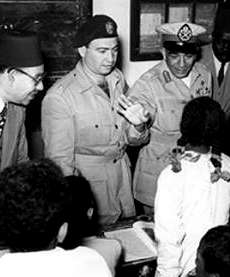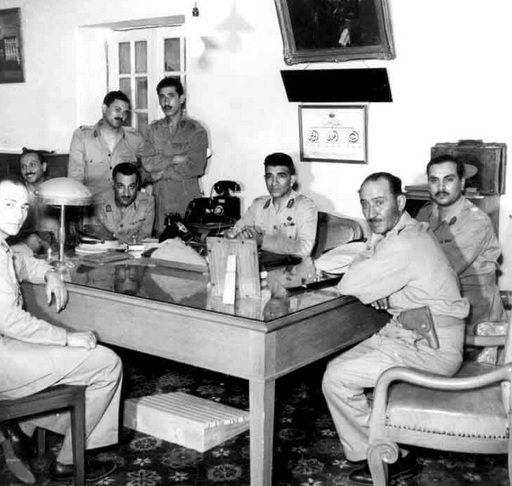|
National Progressive Unionist Party
The National Progressive Unionist Party ( ar-at, حزب التجمع الوطني التقدمي الوحدوي, Ḥizb al-Tagammu' al-Watani al-Taqadomi al-Wahdawi, commonly referred to as Tagammu) is a socialist political party in Egypt. Originally known as the National Progressive Unionist Organization, it was established as the left-wing faction of the governing Arab Socialist Union (ASU) and became an independent party after ASU's dissolution. The party considers itself a defender of the principles of the Egyptian Revolution of 1952. It calls for standing against attempts to reverse the revolution's social gains for labourers, the poor, and other low-income groups. History and profile The party was established in 1977. The founders were two former Free Officers members, Khaled Mohieddin and Kamal Rifaat. Its membership consisted of mainly of Marxists and Nasserists. Since 1978 the party has published a newspaper, '' Al Ahali''. The party boycotted the first presiden ... [...More Info...] [...Related Items...] OR: [Wikipedia] [Google] [Baidu] |
Khaled Mohieddin
Khaled Mohieddine ( arz, خالد محيى الدين, ; August 17, 1922 – May 6, 2018) was an Egyptian revolutionary, politician, and military officer. As a member of the Free Officers Movement (Egypt), Free Officers Movement, he participated in the toppling of Farouk of Egypt, King Farouk that began the Egyptian Revolution of 1952, and led to the establishment of the Republic of Egypt. Mohieddine held important political and media roles throughout Gamal Abdel Nasser's presidency, although the two also had a number of fallings out. An outspoken individual, he was one of the few members of the revolutionary inner circle of Egypt able to disagree passionately with Nasser whilst still retaining Nasser's respect and admiration. His political influence diminished during the early part of Anwar Sadat's presidency until he cofounded a leftist political party, National Progressive Unionist Party, National Progressive Union Party (Tagammu), in 1976. Under Mohieddine's leadership, Tagam ... [...More Info...] [...Related Items...] OR: [Wikipedia] [Google] [Baidu] |
Free Officers Movement (Egypt)
The Free Officers ( ar, حركة الضباط الأحرار, Ḥarakat a-dubbāṭ al-ʾaḥrār) were a group of revolutionary Egyptian nationalism, Egyptian nationalist officers in the Egyptian Armed Forces and Sudanese Armed Forces that instigated the Egyptian Revolution of 1952. Initially started as a small Egyptian military, rebellion military cell under Abdel Moneim Abdel Raouf, which included Gamal Abdel Nasser, Hussein Hamouda, Khaled Mohieddin, Kamal el-Din Hussein, Salah Nasr, Abdel Hakim Amer, and Saad Tawfik, it operated as a clandestine movement of junior officers during the 1948 Arab–Israeli War, Palestine War of 1948-1949. The nationally respected war hero Mohamed Naguib joined the Free Officers in 1949. Naguib's hero status, and influence within the army, granted the movement credibility, both within the military and the public at large. He became the official leader of the Free Officers during the turmoil leading up the Egyptian revolution of 1952, revolution that ... [...More Info...] [...Related Items...] OR: [Wikipedia] [Google] [Baidu] |
Egyptian Parliamentary Election, 1995
Parliamentary elections were held in Egypt on 29 November 1995, with a second round for 168 seats on 6 December.Egypt: Elections held in 1995 Inter-Parliamentary Union The result was a victory for the ruling National Democratic Party (NDP), which won 318 seats. Following the election, 99 of the 112 independents also joined the NDP. Voter turnout was reported to be 47.99%. Results References |
Egyptian Parliamentary Election, 1990
Early parliamentary elections were held in Egypt on 29 November 1990, with a second round for 261 seats on 6 December.Egypt: Elections held in 1990 Inter-Parliamentary Union They followed a in October on the early dissolution of due to issues surrounding the legality of the 1987 elections. However, the elections were boycotted by the ... [...More Info...] [...Related Items...] OR: [Wikipedia] [Google] [Baidu] |
Egyptian Parliamentary Election, 1987
Early parliamentary elections were held in Egypt on 6 April 1987, with a second round for nine seats on 13 April.Egypt Inter-Parliamentary Union They followed a change in the electoral law, approved by a in February, which would allow independent candidates to run in the election. The result was a victory for the ruling National Democratic Party, which won 346 of the 458 seats. Following the election, the Peo ... [...More Info...] [...Related Items...] OR: [Wikipedia] [Google] [Baidu] |
Egyptian Parliamentary Election, 1984
Parliamentary elections were held in Egypt on 27 May 1984. Since the last election in 1979, changes had been made to the electoral system. The 176 two-member constituencies were replaced by 48 multi-member constituencies (totalling 448 seats), with candidates elected on a party list system, with a party needing over 8% of the vote to win a seat.Egypt Inter-Parliamentary Union The result was a victory for the ruling National Democratic Party, which won 390 of the 448 seats. The only other party to win seats was the . Following the election, President |
Egyptian Parliamentary Election, 1976
Parliamentary elections were held in Egypt on 28 October 1976, with a second round in four constituencies on 4 November. While the Arab Socialist Union remained the sole legal party in the country, as in previous elections, these elections were unique in having three distinct political factions of the party compete against each other (the right-wing Socialist Liberal Organisation, the centrist Arab Socialist Organisation and the left-wing National Progressive Unionist Party), along with 208 independents. This electoral experiment would lead, in 1979, to Egypt's first multi-party elections since 1952. Two candidates were elected from each of the 175 constituencies, with a second round of voting required if one or both of the candidates failed to win over 50% of the vote in the first round, or neither of the candidates with over 50% were classed as a worker or farmer (each constituency had to have at least one farmer or worker representing it). [...More Info...] [...Related Items...] OR: [Wikipedia] [Google] [Baidu] |
Egyptian Front
The Egyptian Front ( ar-at, الجبهة المصرية, al-Gabha al-Masreya) is an alliance of political parties contesting the 2015 Egyptian parliamentary election in a joint list with the Independent Current Coalition, called Egypt. The alliance was established on 17 August 2014. Former presidential candidate Hamdeen Sabahi has criticized the alliance by stating that it represents "Mubarak-era politics". The Modern Egypt Party withdrew from the coalition. The Tagammu Party is not part of the coalition. The Egyptian Patriotic Movement and the My Homeland Egypt Party left the alliance and joined the For the Love of Egypt coalition following a failed attempt to merge the For the Love of Egypt coalition and the Egyptian Front. Both of the parties are no longer part of that alliance and instead joined the Egypt alliance. Affiliated parties *Republican People's Party * National Party of Egypt * Egyptian Liberation Party *Egyptian Patriotic Movement *My Homeland Egypt Party *Democra ... [...More Info...] [...Related Items...] OR: [Wikipedia] [Google] [Baidu] |
Electoral Alliance
An electoral alliance (also known as a bipartisan electoral agreement, electoral pact, electoral agreement, electoral coalition or electoral bloc) is an association of political party, political parties or individuals that exists solely to stand in elections. Each of the parties within the alliance has its own policy, policies but chooses temporarily to put aside differences in favour of common goals and ideology in order to pool their voters' support and get elected. On occasion, an electoral alliance may be formed by parties with very different policy goals, which agree to pool resources in order to stop a particular candidate or party from gaining power. Unlike a coalition formed after an election, the partners in an electoral alliance usually do not run candidates against one another but encourage their supporters to vote for candidates from the other members of the alliance. In some agreements with a larger party enjoying a higher degree of success at the polls, the smaller ... [...More Info...] [...Related Items...] OR: [Wikipedia] [Google] [Baidu] |
Egyptian Bloc
The Egyptian Bloc ( ar, الكتلة المصرية, ') was an electoral alliance in Egypt. It was formed in August 2011 by several liberal, social democratic, and leftist political parties and movements, as well as the traditional Islamist Sufi Liberation Party to prevent the Muslim Brotherhood, and its affiliated Freedom and Justice Party from winning the parliamentary election in November of that year. As of September 2012, all former constituent parties left the bloc, joined other alliances or merged into other parties. Establishment The 15 groups shared the common vision of Egypt as a "civil democratic state", and feared that in case of an Islamist electoral victory the constitution could be changed to an Islamic one. The establishment of the coalition was publicly announced on 15 August 2011 in Cairo. The assembly's objective is to present a united list of candidates for the parliamentary election, to raise funds and to campaign together. The alliance supports Prime Min ... [...More Info...] [...Related Items...] OR: [Wikipedia] [Google] [Baidu] |
2011–12 Egyptian Parliamentary Election
Parliamentary elections were held in Egypt from 28 November 2011 to 11 January 2012, following the revolution that ousted President Hosni Mubarak, after which the Supreme Council of the Armed Forces (SCAF) dissolved Parliament. However the dissolution was ruled unconstitutional and Parliament was reinstated. Originally, the elections had been scheduled to be held in September 2011, but were postponed amid concerns that established parties would gain undue advantage. The elections were proclaimed the first honest national elections of any sort held in Egypt since the overthrow of the monarchy in 1952. However, there were also complaints of irregularities and fraud. The main focus of the newly elected Parliament was to be the selection of the members of a Constituent Assembly. Background In late 2010, a parliamentary election was held, though it was followed by controversy and repression as well as accusations of fraud. Following similar events in Tunisia during the Arab Sprin ... [...More Info...] [...Related Items...] OR: [Wikipedia] [Google] [Baidu] |
Egyptian Parliamentary Election, 2010
Parliamentary elections were held in Egypt in 2010. The first stage was held on 28 November 2010 and the second round was held on 5 December 2010. The election was scheduled in two stages to form the Ninth Assembly since the adoption of the 1971 Constitution. 444 ordinary seats were contested with 64 additional seats reserved for women, while the President appointed 10 members, making a total of 518 seats. Human rights groups said this was the "most fraudulent poll ever" in Egypt's history. It is considered to have been a factor in the Egyptian Revolution that occurred shortly afterwards in early 2011. Background This election follows the Muslim Brotherhood completing the five-year parliamentary term in which it held on as the largest-ever minority bloc. Electoral system The election process will run in the three stages single member plurality, with millions of registered voters in the 222 constituencies. Most of the political parties in Egypt have been advocating for a Pa ... [...More Info...] [...Related Items...] OR: [Wikipedia] [Google] [Baidu] |




